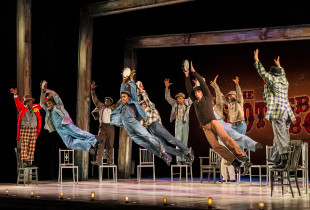The Independent Artist

It sounds like you're looking for a true artist’s lifestyle: late nights, varying schedules, and getting to work on a variety of projects. Independent artists include actors, directors, designers, playwrights, and some stage managers. Independent artists usually don’t work exclusively with one theatre or organization, and may travel to different cities or countries throughout the year for various projects.
Independent artists—even those with agents and managers—have to take an active role in promoting and pursuing their careers and finding their next job. This can include maintaining a personal website, sending out resumes, checking websites like Backstage.com daily for new jobs, networking at special events, and finding clever ways to create work for themselves (like writing and starring in a web series). Many artists will tell you that managing their career is a full-time job!
Independent artists rarely get a steady paycheck or health benefits from a single business or organization. Instead, they sign a separate, short-term contract for each project they work on. This means an independent artist may have very busy times and times when they’re not working at all. For this reason, many independent artists choose to have a “day job.” Successful independent artists enjoy the freedom of taking only projects they enjoy, creating their own work, and having more control over their own schedules.
Many independent artists choose to join unions, such as Actors Equity or the Society of Stage Directors and Choreographers. Unions protect independent artists from unfair or unsafe working conditions and offer benefits such as affordable health insurance, financial services, and job boards.
Education levels vary greatly among independent artists. Many find that college not only helps them develop their craft, but also gives them a strong network of other artists and working professionals they can tap into after graduation to help get jobs. Artists can choose a bachelor of fine arts (BFA) program, where the majority of their classes are in their art form, or a bachelor of arts (BA) program, which includes more general education courses or courses in other subjects. Not all successful artists have a degree in their field—it’s common to meet scenic designers who majored in engineering, or actors with an English degree. Some artists choose to get an advanced degree from a graduate program (usually a master’s degree) to continue their studies after college. There are also specialized trade schools focusing on a specific creative career, such as acting academies or design schools.
Interested in one of the bold areas of theatre below? Check out related job options you might enjoy as an Independent Artist!
Acting
Directing
Playwriting
Design
Technical Theatre
What's Your Theatre Career Path?
If you’re curious about careers in theatre and wondering which ones might be right for you, we’ve created a quick quiz to help you think about the type of job you might want within the arts and what kind of lifestyle and education that career path requires.
Take the Quiz